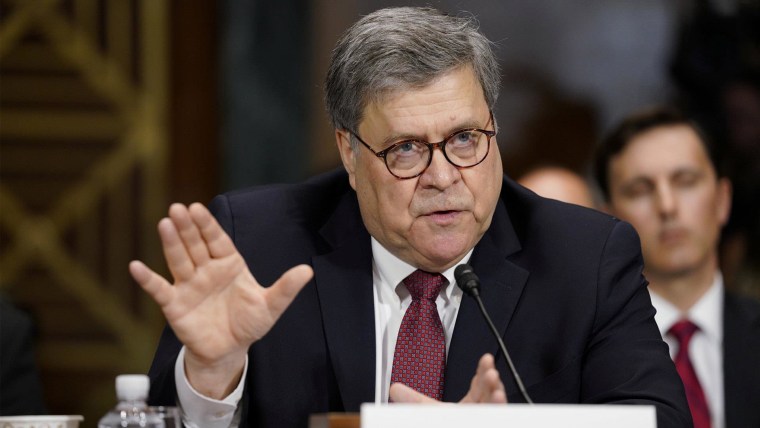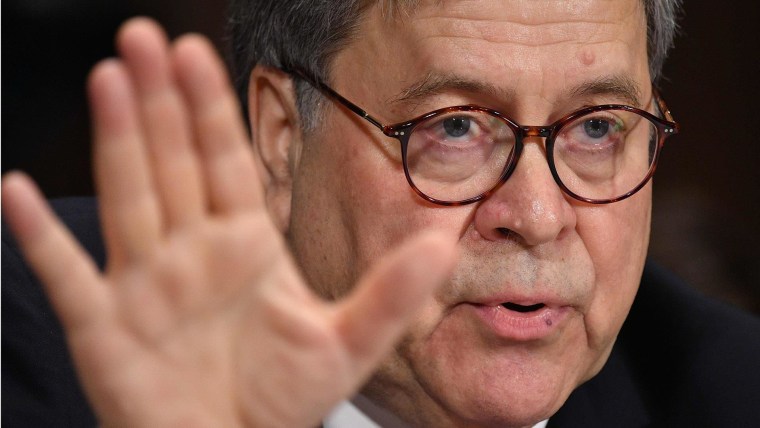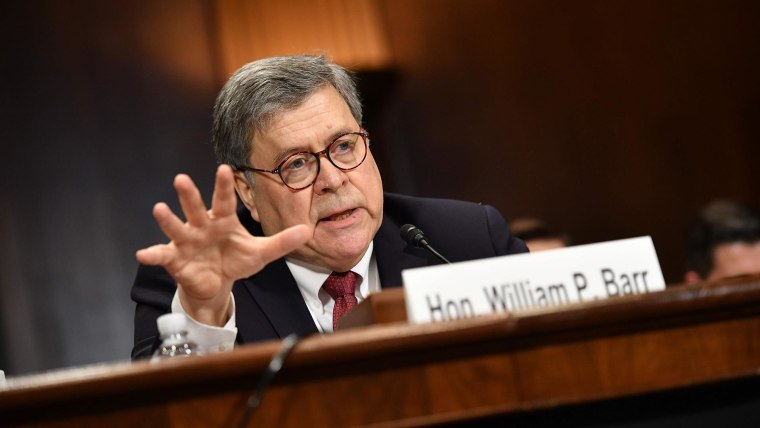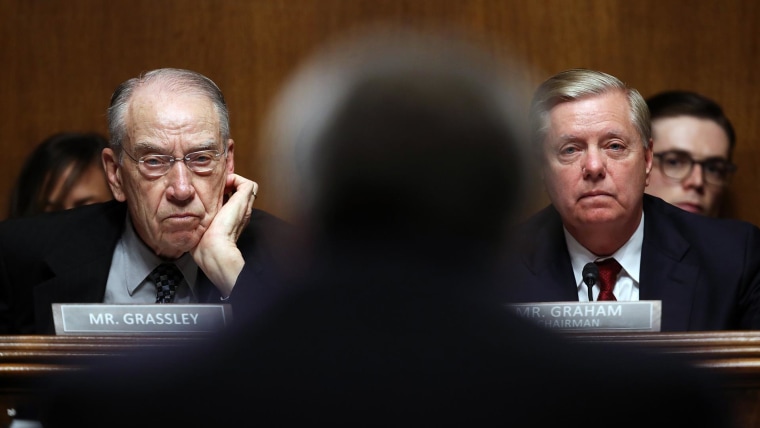WASHINGTON — In his first public testimony since the release of special counsel Robert Mueller's report, Attorney General William Barr sought to defend himself Wednesday against accusations from Democrats that he misled Congress about the Mueller team's concerns over his description of their findings.
At a Senate Judiciary Committee hearing, Democrats pressed Barr about a letter Mueller sent him that said the attorney general's initial four-page description of the special counsel's conclusions had caused public confusion and did not fully capture his report’s "context, nature and substance.”
After hearing Barr's testimony, several of those Democrats called for his resignation.
Sen. Patrick Leahy, D-Vt., asked Barr why he testified to Congress last month that he didn’t know whether Mueller supported Barr’s conclusion that there was insufficient evidence to say President Donald Trump had obstructed justice, even though Barr had received Mueller’s letter about two weeks earlier.
The attorney general answered that he had spoken with Mueller by phone after receiving his letter, and the special counsel told him he did not think Barr's description of the report's findings were inaccurate. Barr later said Mueller's letter was "a bit snitty, and I think it was probably written by one of his staff people."
Barr recalled Wednesday that in his testimony before Congress last month, lawmakers asked him about news reports that described "unidentified members expressing frustration over the accuracy relating to findings."
"I don't know what that refers to at all," Barr said. "I talked directly to Bob Mueller, not members of his team."
Earlier in Wednesday's more-than-five-hour hearing, the attorney general said Mueller had told him in their phone conversation that “the press reporting had been inaccurate” and he was concerned about Barr's description of the reasons why the special counsel's report did not reach a conclusion on obstruction.
Barr's letter to Congress in late March, which was made public at the time, said the Mueller investigation "did not establish that members of the Trump Campaign conspired or coordinated with the Russian government in its election interference activities." It also said the special counsel's investigation "did not draw a conclusion — one way or the other — as to whether the examined conduct constituted obstruction."
During their call, Mueller "wanted more put out on that issue," Barr said. "He argued for putting out summaries of each volume, the executive summaries that had been written by his office."
"But he was very clear with me that he was not suggesting that we had misrepresented his report," he added.
Barr said he decided not to put out summaries or portions of the report piecemeal because that might lead to further confusion about its contents.
Speaking about Barr’s testimony in April that he didn't know whether Mueller's team was concerned about the attorney general's handling of their findings, Leahy said, “I feel your answer was purposely misleading, and I think others do too.”
Senate Minority Whip Dick Durbin, D-Ill., also grilled Barr about his earlier testimony in light of Mueller's letter, which The Washington Post first reported late Tuesday.
“Attorneys don't put things in writing unless they’re pretty serious about them,” Durbin said. "There's an old rule in politics: A good politician doesn't write a letter and doesn't throw one away."
Later, in an exchange with Sen. Kamala Harris, D-Calif., Barr said he did not personally review the underlying evidence from Mueller's investigation in reaching his conclusion about obstruction.
"We accepted the statements in the report as the factual record," Barr said. "We did not go underneath it to see whether or not they were accurately accepted as accurate."
"Yet you represented to the American public that the evidence was not, quote, sufficient to support an obstruction of justice offense?" asked Harris, who is running for president in 2020,
Harris then asked, "If then in any U.S. attorney’s office across the country, the head of that office, when being asked to make a critical decision about, in this case, the person who holds the highest office in the land and whether or not that person committed a crime, would you accept them recommending a charging decision to you if they had not reviewed the evidence?"
"Well that’s a question for Bob Mueller," Barr answered. "He’s the US attorney, he’s the one who presents the report."
Harris said later that she thought Barr's responses to her questions disqualified him from serving as U.S. attorney general.
"No prosecutor worth her salt would make a decision about whether the president of the United States was involved in obstruction of justice without reviewing the evidence," she said. "This attorney general lacks all credibility and has, I think, compromised the America public's ability to believe he's a purveyor of justice."
Trump discussed Barr's testimony in an interview on Boston Herald Radio's "The Adriana Cohen Show, saying, “I heard that the attorney general was really, really solid and did a great job today."
The president added that he thinks Democrats “are very devastated because they looked at the report and there was absolutely no collusion, and there’s no obstruction either, and they were hoping against hope because that’s the only way they could actually get lucky.”
Later Wednesday evening, the Justice Department announced Barr would not testify at a second planned hearing, before the House Judiciary Committee on Thursday, because of Democratic lawmakers' demand he be questioned by their staff. The development could lead to a possible legal battle if House Democrats subpoena the attorney general.
Questions on McGahn, Lewandowski episodes
At the start of Wednesday's hearing, Judiciary Committee ranking Democrat Dianne Feinstein of California pressed Barr about an episode outlined in Mueller's 448-page report in which Trump directed then-White House counsel Don McGahn to call Deputy Attorney General Rod Rosenstein to have Mueller "removed" just weeks after he was appointed as special counsel in 2017.
According to the report, McGahn recalled Trump phoned him and told him to "tell Rod that Mueller has conflicts and can't be the Special Counsel" and "Mueller has to go," McGahn recalled. The episode prompted McGahn to consider resigning, the report said.
Then, after the news media reported Trump's demand, the president denied making it and insisted McGahn dispute news reports, Mueller wrote. Trump said he merely wanted McGahn to inform Rosenstein of Mueller's supposed conflicts of interest — conflicts that McGahn and other advisers told Trump were "silly" and "not real," the report said.
When asked by Feinstein if Trump's actions constituted obstruction of justice, Barr answered, “We felt that that episode, the government would not be able to establish obstruction."
"So you can, in this situation, instruct someone to lie?" Feinstein later asked.
"Well, to be obstruction of justice, the lie has to be tied to impairing the evidence in a particular proceeding," Barr said. "McGahn had already given his evidence" with testimony to Mueller.
He added that there was a “distinction” between firing Mueller with no basis and having him removed over a conflict, because the latter would likely mean another special counsel would be appointed and the probe would continue.
When asked whether it was necessary to establish "an identifiable conflict that made sense" to ensure Trump's complaint about Mueller wasn't "a fabrication," Barr said that "as a matter of law, I think the department's position would be that the president can direct the termination or the replacement of a special counsel," and "the obstruction statute does not reach that conduct."
"Putting that aside, the next question would be, if it reached the conduct, could you here establish corrupt intent beyond a reasonable doubt," he said, elaborating that the government would have difficulty reaching that conclusion.
Leahy further asked how Barr could tell Congress that Trump had fully cooperated with Mueller's probe given that Trump never testified to the special counsel and that the president told his former campaign manager Corey Lewandowski to direct then-Attorney General Jeff Sessions to unrecuse himself from the investigation and limit Mueller's focus to future elections, according to Mueller's report.
“Asking Sessions to unrecuse himself we do not think is obstruction,” Barr answered. He added, “I don’t see any conflict between that and fully cooperating with the investigation.”
When Leahy pointed out that Mueller said in the report that he found Trump's written answers to his questions inadequate, Barr answered, "I think he wanted additional, but he never sought it."
Barr's reasons for letter to Congress
In his opening statement, Barr offered some details on why he wrote his March 24 letter to Congress, in which he concluded that the president did not commit obstruction.
Barr said that Mueller came to the Department of Justice and said his team was not going to reach a decision on obstruction, which Barr said “frankly surprised” him.
“We did not understand exactly why the special counsel was not reaching a decision," Barr said. "And when we pressed him on it, he said his team was still formulating an explanation."
Barr said he and Rosenstein, who is stepping down later this month, felt that, because of the massive interest in the probe, they had the responsibility to provide the public with some conclusion to avoid leaving such a high-profile investigation unresolved for several weeks while they worked to redact the report and make it public.
"I analogize it to announcing after an extended trial what the verdict of the trial is," Barr said. He added that the letter to Congress was not intended as a summary of the entire report, but a snapshot of the investigation’s bottom-line conclusions.
Later Wednesday, Sen. Richard Blumenthal, D-Conn., slammed Barr for his testimony and handling of the Mueller report, saying he had been “very adroit and agile” in his responses during the hearing.
“But I think history will judge you harshly and maybe a bit unfairly because you seem to have been the designated fall guy for this report,” Blumenthal said.
Barr’s credibility was undermined at the Justice Department and with Congress and the public. Blumenthal said, because the attorney general ignored in his press conference the day the report was released and in his letter to Congress that, as the senator saw it, Mueller had found substantial evidence of obstruction.
Barr responded that he had not exonerated Trump, repeating that he and Rosenstein did not have sufficient evidence to establish an obstruction offense.
“Everyone can decide for themselves, There’s an election in 18 months," Barr said, adding, "We have to stop using the criminal justice system as a political weapon.”
Republicans defend Barr
Republican senators defended the attorney general during the hearing, with some asking questions that allowed Barr to justify his conclusions about Mueller's investigation.
Committee Chairman Lindsey Graham, R-S.C., said Mueller had “ample resources,” took a lot of time and talked to numerous people over the course of his nearly two-year probe, and yet the special counsel found “no collusion, no coordination, no conspiracy” between the Trump campaign and the Russian government during the 2016 presidential campaign.
Mueller's report, however, detailed numerous contacts between Trump associates and Russians over the course of the 2016 campaign and during the transition.
“The president never did anything to stop Mueller from doing his job,” Graham claimed, adding, “For me, it’s over.”
After the hearing, Graham told reporters he would not call on Mueller to testify before his committee despite Feinstein's request that he do so.
Sen. Ted Cruz, R-Texas, said during the hearing that Barr had been subjected to “slanderous treatment, the Kavanaugh treatment," referring to last year's confirmation hearings for Supreme Court Justice Brett Kavanaugh, who vehemently denied accusations of sexual assault.
Cruz said that Democrats and journalists continually alleged there was Trump campaign collusion with Russia, “some using extreme rhetoric calling the president a traitor.”
“We heard very little of that in this hearing today,” Cruz said, adding that Democrats’ principal line of attack had morphed into accusations based on the Mueller letter released Wednesday morning.
“If this is their whole argument, they ain’t got nothing,” Cruz said.
Democratic presidential contender Sen. Cory Booker, D-N.J., however, said Mueller's report outlined a “deep litany of lies and deceit and misconduct," adding, “You seem to be excusing a campaign that literally had hundreds of contacts with a foreign adversary.”
Barr responded, “There’s no indication that [the Trump campaign] engaged in the conspiracy to hack or that they engaged in any action with respect to the dissemination that was criminal.”
Reaction to Mueller's letter
In statements after reports surfaced about Mueller's letter to Barr, several key House Democratic leaders called for Mueller to testify, while several others, including 2020 presidential contenders, demanded Barr resign.
House Judiciary Committee Chairman Jerrold Nadler, D-N.Y., said Tuesday that he had demanded a copy of the letter and repeated his request that the special counsel testify before Congress.
"The Department of Justice has also been reluctant to confirm a date for Special Counsel Mueller to testify," he said. "Given this evening’s reports, I will press the Department to schedule that hearing without delay.”
House Speaker Nancy Pelosi, D-Calif., tweeted Tuesday night that she also thought Barr had been misleading and called for Mueller to testify.
“Attorney General Barr misled the public and owes the American people answers," Pelosi wrote. "It’s time for DOJ to release the full report & all underlying docs — and finally allow Mueller to testify. Americans deserve the facts. Barr must stop standing in the way.”
House Oversight Committee Chairman Elijah Cummings, D-Md., echoed her in a post on Twitter.
“Barr misled Congress and the American people to protect the President," he wrote. "There must be consequences. We must see the letter, get the full report and docs, and hear directly from Mueller.”
House Intelligence Committee Chairman Adam Schiff, D-Calif., meanwhile, said in an interview Wednesday on “CBS This Morning” that, based on the existence of Mueller's letter, Barr’s statements to Congress about not knowing what the special counsel thought about his handling of Mueller's report were “deliberately false and misleading” and “most people would consider that to be a lie.”
“He knew exactly what he was being asked by Congress, and he knew his answer was false," Schiff said. "So, look, there's no sugar-coating this. I think he should step down.”




